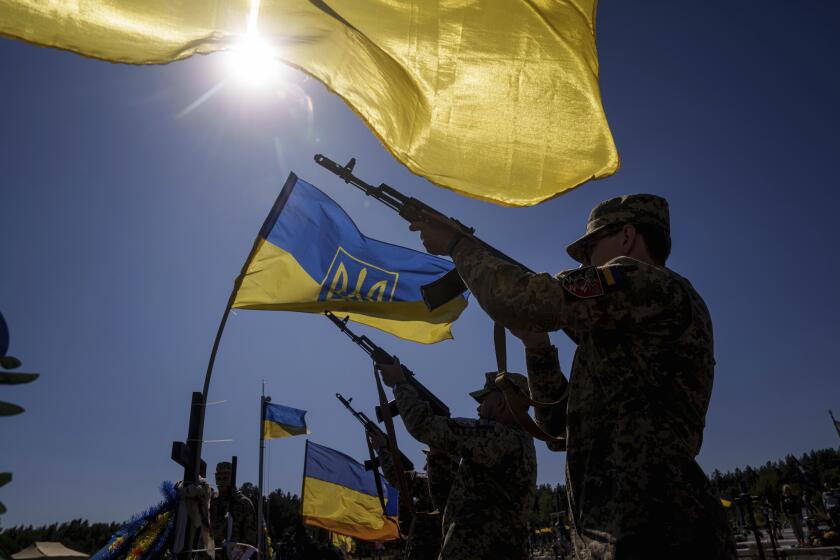Op-Ed: How big a nuclear arsenal do we really need?
If President Obama wants to use his last two years to further his agenda, here’s something he could do that would both advance the cause of global security and save the country money: suspend plans to develop a new arsenal of American nuclear weapons.
Obama started his presidency with a sharp focus on reducing the world nuclear threat, and he had considerable initial success. As columnist Jim Hoagland wrote in 2010, “President Obama has turned the once utopian-sounding idea of global nuclear disarmament into a useful tool for U.S. foreign policy.”
But by 2011, his plans to secure all nuclear materials from terrorists, stop new nuclear states and shrink global arsenals had slowed to a crawl. While his promised policies to reduce the role and numbers of nuclear weapons lagged, the Pentagon and Congress raced ahead with plans to buy a whole new generation of nuclear-armed submarines, bombers and missiles. Over the next few years, government actions could lock in spending on these new weapons programs for the next 50 years.
Unless something is done soon, we will lay out as much as a trillion dollars over the next few decades to replace our obsolete Cold War nuclear arsenal. We will buy thousands of new hydrogen bombs and mount them on hundreds of new missiles and planes. The Congressional Budget Office estimates that over the next 10 years alone, the government will lay out $570 billion for new nuclear weapons and related programs such as missile defense.
Proponents claim the spending is necessary to assure the nation’s security. But history shows that buildups like this trigger new arms races, inspiring other nations to match or exceed our capabilities.
Already, the Pentagon has submitted its wish list for the next budget to the president, and in coming weeks Obama will finalize the budget and submit it to Congress. This will be his “legacy” budget, as one senior defense official said. It will be his last big chance to change the country’s approach to nuclear spending.
The president should submit a budget to Congress that suspends spending on new nuclear weapon programs. Congress will object, of course, but that will prompt a long-overdue public conversation on nuclear policy.
In the absence of such a discussion, we risk unnecessary spending on an arsenal. We are, for example, about to commit to spending $350 billion to develop, produce and deploy a new fleet of 12 nuclear-armed submarines. But we have not yet determined whether we will need all — or any — of the 1,000 hydrogen bombs they will carry. And have we considered how other nations, including China, will react to the new subs?
Secretary of the Navy Ray Mabus made the case to Congress this month for additional funding to build the submarine fleet, saying that without extra money, the new subs would “gut the rest of our shipbuilding program.” In making his case, he also noted that “we’ve got to have this debate now” over the cost of the nuclear triad. I agree with that part of his testimony wholeheartedly.
The Pentagon budget is about to be cut by tens of billions of dollars a year, as part of the fallout from the congressional budget collapse and the resulting sequester. This will begin to force choices. But contracts to update the nuclear arsenal have a head start, and unless we have a full discussion now, unnecessary programs may be locked in before the budget crunch fully hits.
Instead of blindly moving ahead with building submarines and other expensive nuclear paraphernalia, let’s determine our actual needs. Let’s fully examine whether modifying existing submarine designs might suffice. And while we’re at it, let’s talk about a range of other expensive nuclear weaponry on the drawing boards, including a new nuclear-armed penetrating bomber and a new standoff nuclear cruise missile.
Last year, Sen. Dianne Feinstein (D-Calif.) weighed in on the issue, asserting that the nation’s “nuclear forces are larger than needed for current military missions.” And she offered sensible advice: “It is time to think creatively about how to maintain a much smaller nuclear deterrent at an affordable cost.”
Who could disagree with that?
Joseph Cirincione is president of Ploughshares Fund and the author of “Nuclear Nightmares: Securing the World Before It Is Too Late.”
Follow the Opinion section on Twitter @latimesopinion
More to Read
Sign up for Essential California
The most important California stories and recommendations in your inbox every morning.
You may occasionally receive promotional content from the Los Angeles Times.










